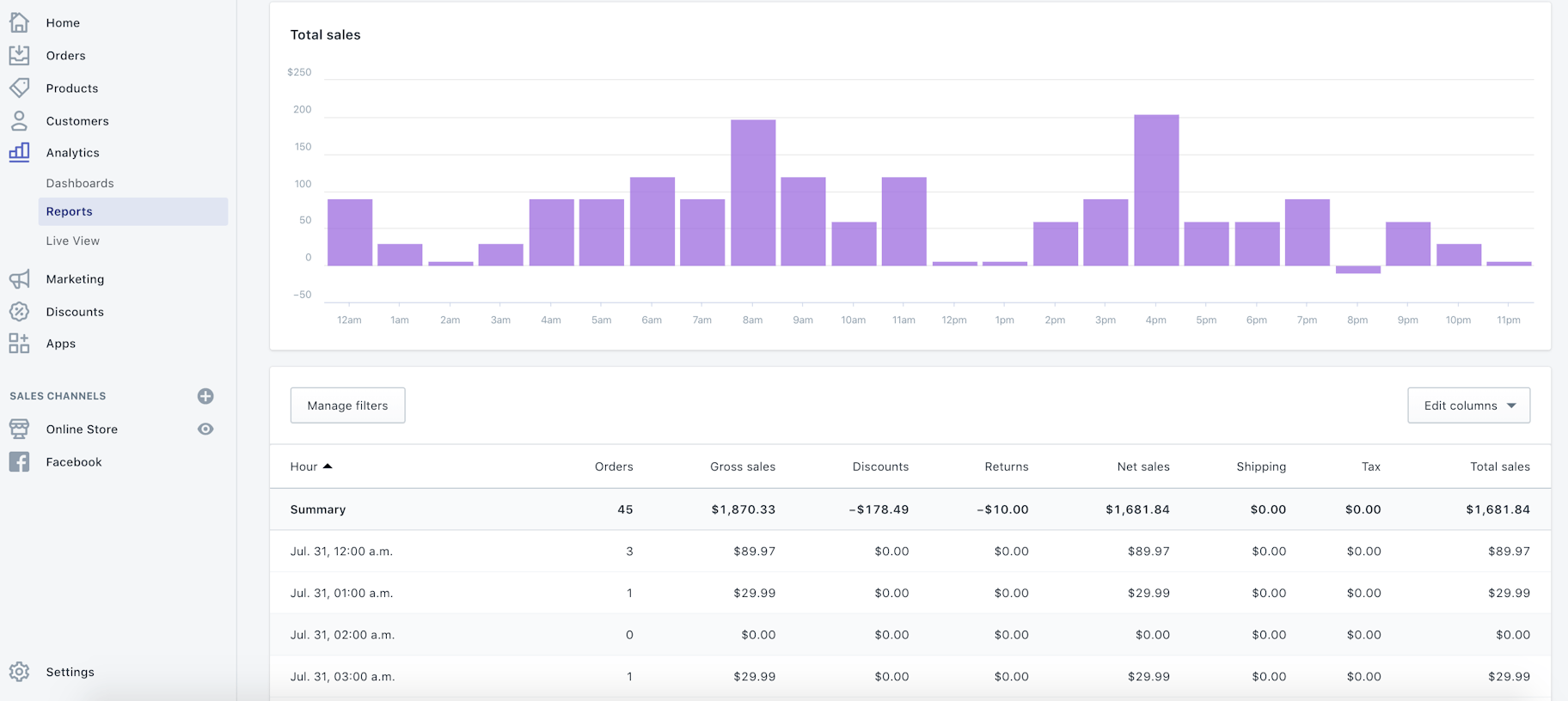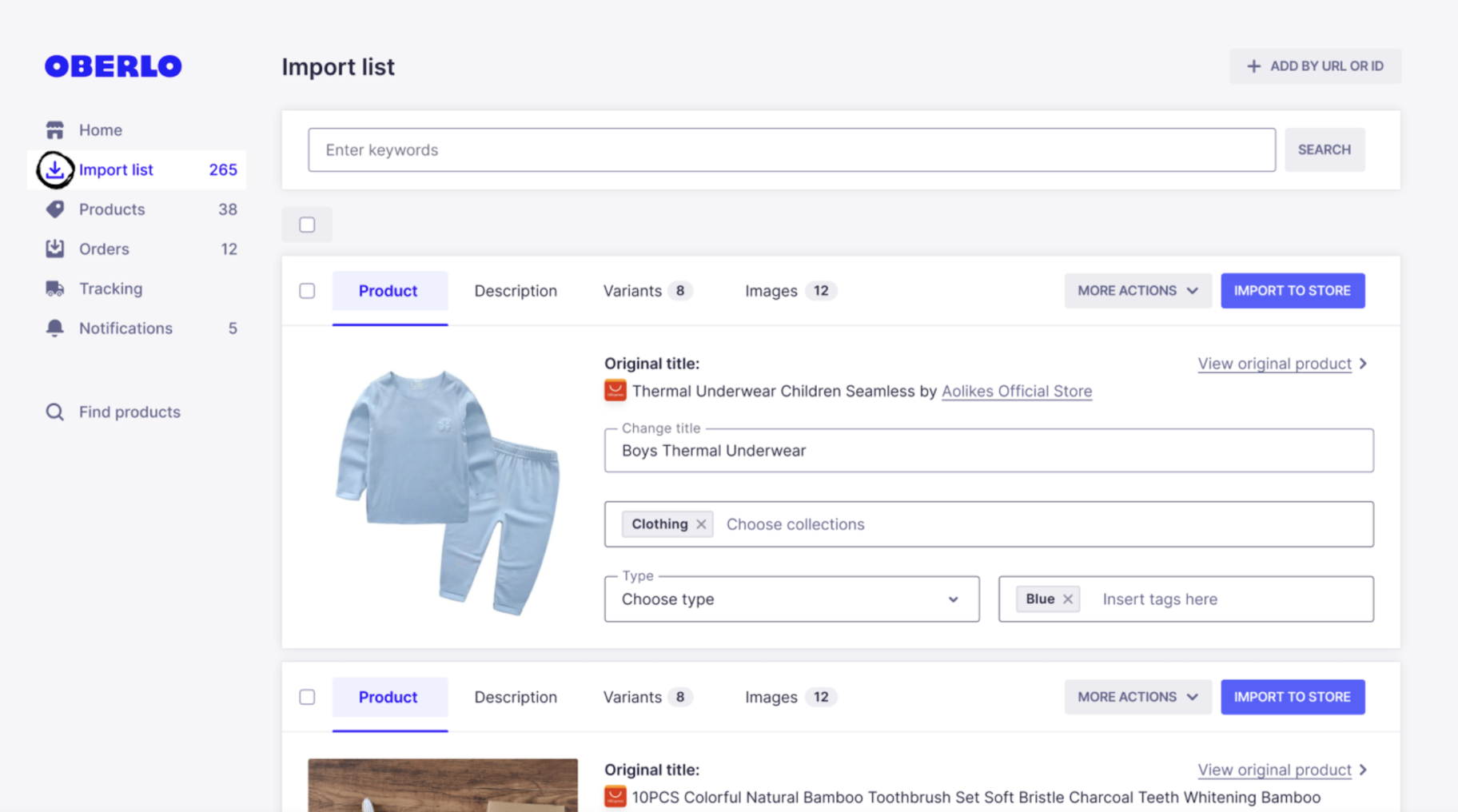
What is Shopify? You might’ve watched a YouTube video about starting an online store on Shopify. Or maybe your friend keeps talking about Shopify and you’re too embarrassed to ask. Well, fortunately for you, we’re going to share what Shopify is, the pros and cons of using Shopify, what it offers, and so much more. So, let’s dive in.
What is Shopify?
Shopify is an ecommerce platform that you can use to build your store both online and offline. Bloggers use WordPress. Store owners use Shopify. It allows you to sell both online with your own website and/or in person with Shopify POS. This ecommerce website builder has features for everyone from beginners to ecommerce experts.
You can sign-up for a free 14-day trial of Shopify to test it out for yourself. During your trial, you can build your own online store, test out free Shopify apps, and if you promote hard enough, make your first sale. Shopify’s pricing starts at $9 a month if you use the Lite plan. However, most first-time store owners start on Shopify’s Basic plan at $29 a month. If you’ve been running a business for quite some time, you may prefer Shopify, Advanced Shopify or Shopify Plus depending on your business needs.
What Does Shopify Do?
Shopify provides you with the foundation to run an ecommerce business. As you venture into the online selling space, you’re expected to open a storefront, showcase products, engage with customers, accept payments, and more. Shopify offers all the tools you need to manage each of those activities. Think of Shopify’s platform as a facilitator working to ease the process of selling products over the web.
What is Shopify Plus?
Shopify Plus is Shopify’s enterprise ecommerce platform for larger businesses or businesses looking to scale. It offers advanced reporting features, higher priority customer support, capacity to handle higher order volumes, and more.
What is Shopify Lite?
Shopify Lite is an affordable plan that allows you to sell products on an existing website. If you have a website that isn’t hosted on Shopify, sell with a Buy Button without Shopify’s hosting. You can also use Messenger chats, sell both online and offline, and send invoices on the $9 plan.
What is Shopify POS?
Shopify POS (Point of Sale) is an application that allows you to sell products offline. You can sell products at a physical store, trade shows, pop-up shops, or other events in-person using Shopify POS. You can accept payments with your iPhone, iPad, or Android using the POS app.
Why Shopify? Pros and Cons of Shopify Ecommerce
Why use Shopify for your ecommerce business? Well, Shopify offers several advantages over other platforms. Here are a few:
Shopify Pros
1. Detailed Shopify Admin
In the backend of your Shopify store, you’ll find a whole range of reports and features that help you understand how your online store is performing. You can view the number of orders at a glance. You can find your best-performing product pages. And you can even watch a real-time view of your website visitors to see what stage in the funnel they’re in. Shopify is a comprehensive tool for an online retailer, allowing you to get an in-depth understanding of all of your online store’s details.

2. Free Features
If you’re building a new website, you probably need to pay for a theme (the design/look of your website). But on Shopify, a free theme is loaded onto your store automatically that you can start customizing any way you want. This is why Shopify is ideal for beginners wanting to dive in or play around to see what the possibilities are. You even have the freedom to customize your website to suit your branding style. You can choose free fonts (already installed on your store), or change up the color scheme, add your own photos, and more. There are also thousands of ecommerce-themed stock photos you can choose from taken by Shopify photographers. You can find them in the “free images” section of your Shopify theme. The other option is to send your items to a professional photography service. Besides all of that, you can take advantage of the various Shopify tools and to build a better, more powerful website.

3. Shopify is on a Cloud Network
When I switched from WooCommerce to Shopify, my favorite pro was that my website would be on a cloud network instead of a server. Anyone who has ever paid for a server knows very well that they crash at the wrong times, making you lose a lot of money from downtime. Servers often crash on Black Friday or during big events. If you share a server (which is what most new entrepreneurs can afford), you kind of have to hope that the other websites aren’t as popular. By being on a cloud network, the odds of your website being down are rare, allowing you to run your business with ease. And this cost is bundled into your subscription, making it one less thing to worry about.
4. There’s a Plan for Everyone
Let’s be honest, there are costs associated with running a business. You’ll need to pay for products, marketing costs, new domain, and of course Shopify. But Shopify has a pricing plan for everyone. If you’re on a really tight budget, you can pay for Shopify Lite for only $9 a month. If you’re looking for a white-glove service, you can use Shopify Plus. You can move through the plans as your business grows, too.
5. Tons of Apps
There’s literally an app for almost everything in the Shopify App Store. You’ll find countdown timers, image background removers, product sourcing apps like Oberlo (that’s us), and so much more. While there are a lot of paid apps, there’s also a bunch of free apps in the store. Adding an app to your website isn’t necessary. But if you’re looking to add products to your store, consider checking out the Oberlo app (the Explorer Plan is free and includes up to 500 products on your store).

6. Tons of Support
If you’re still wondering, why choose Shopify?, the depth of support the company offers should offer a convincing reason. Shopify wants you to succeed on their platform. That’s why they have their own blog where ecommerce experts share their best tactics. That’s why they created Shopify Academy (now referred to as Shopify Compass), where you can take free ecommerce courses and learn at your own pace. And that’s why they have so many customer support reps who will happily answer any questions you have. There are even Facebook Groups created by Shopify users who want to help new store owners succeed. The support ecosystem at Shopify is massive. There’s always someone willing to help you grow.

7. Low Barrier to Entry
Anyone can start a Shopify store. It won’t be easy. But it’s a heck of a lot easier than it was to build an online business 20 years ago. Did you know people had to mail in checks to Amazon when it first launched? Yeah, those days are over. And the truth is, as time passes, it’ll get even easier to build an online business. Shopify is leading the initiative of lowering barriers to ecommerce. Compare Shopify with other solutions, and you’ll know why thousands of businesses sign up to this platform every year.
Shopify Cons
1. There’s a Learning Curve
When building a Shopify store, what you’re really building is a business, not a passive income stream. And starting a business isn’t necessarily an easy thing to do. Figuring out how to use Shopify and build a profitable store takes months of experimentation. It can take a while to know where every section of your store is located in the admin. But for the most part, Shopify is intuitive. It just takes some practice.
2. Shopify Alone Won’t Guarantee Your Success
Shopify has so many great features and apps that make running an online store easier than building something custom from scratch. The problem is that it’s actually up to you to make your store a success. You need to have the right mindset pushing you to learn. You need to have the marketing chops to promote your business better than the competition. Your success is in your hands, not Shopify’s.
Shopify Overview: How Does Shopify Work?
Shopify is an ecommerce platform that hosts your online store. It helps organize the layout of your store’s appearance through themes (which you’re free to modify or change any way you want). It also offers payment processing, which allows you to accept and receive payment for the products you sell. Shopify owns the popular dropshipping app called Oberlo, which allows you to choose from millions of products that you can start selling the same day, without having to pay for inventory upfront. Here’s more on Shopify dropshipping.
So how does Shopify work?
Well, first you need to design or modify your Shopify store, include products on it, and test your website to ensure that both desktop and mobile are ready for public view.
Then, you promote the heck out of your products. If you’re selling online, a customer visits your online store. You can view in real-time in the Shopify admin whether that customer is adding a product to their cart or completing a purchase. If a customer buys from your store, Shopify will process the payment for you and you’ll get paid. After a payment has been made, you can process the order so that the customer receives the product. You can access Shopify reports to better understand who your audience is. Customers can opt-in to your email list when they become customers allowing you to remarket to them.
Ultimately, Shopify allows you to not only build an online store but gives you insights about your customers so you can better serve your audience. With so many features, it’s basically your go-to tool to building a successful online store.
What Can You Sell on Shopify
On Shopify, there are always new trending products that you can sell on the platform. You can sell anything – from fashion to beauty to home and garden. Here are a few popular products you can consider selling:
- Clothing
- Jewelry
- Home accessories
- Travel products
- Baby or maternity products
- Bags and luggage
- Fitness accessories
- Beauty products
- Kitchenware
- Pet products
- Automotive accessories
- And much more!
Here are some fashion products you can upload to your Shopify store using the Oberlo app.

However, Shopify does have some strict guidelines on what you can’t sell, too. If you sell restricted products like the ones on this list, you risk getting suspended from the platform:
- Certain firearms and their parts
- Counterfeit or unauthorized goods
- Gambling products
- Regulated products or services
- Adult products
- Drug paraphernalia
- Event tickets
- High-risk businesses such as bankruptcy lawyers, computer technical support, telecommunications equipment, etc.
- And more.
Basically, if it’s illegal or regulated, it’s likely also not permitted to sell on Shopify. For those new to online selling, it helps to know how to avoid counterfeit goods when sourcing products for their store’s inventory..
How to Grow Your Shopify Store
You can grow your Shopify store a number of ways. Here are a few ideas to get you started on Shopify:
- Create Ads – You can run ads on various platforms such as Facebook, Google, and almost any other social network. Ideally, you want to pick the platform where your audience spends the most time. It’s also important to choose a platform where the targeting options are expansive, allowing you to exactly pinpoint the ideal customer. To date, Facebook and Google are the most popular ad platforms. But ultimately, you want to pick the one that’s best for your niche.
- SEO – SEO is a powerhouse at bringing in relevant traffic to your website. Almost all new store owners neglect ecommerce SEO as a growth tactic. Oftentimes, new entrepreneurs want to make a quick buck so they focus on ads. However, after months of investing in ads they realize that their acquisition costs are too high.With SEO and content marketing, you can drive free organic traffic to your website. The right strategy can also lower your acquisition costs and improve the conversion rate.
- Social Media – Before you make your store public, you should already be building an audience. For example, starting an Instagram account a few weeks before launching your store allows you to promote to an audience at launch. With an audience in place, you’ll potentially be able to generate some sales with the link in your bio or Story.
Shopify Customer Reviews
There are plenty of Shopify customer reviews on the internet, so you can seek third-party validation about its credibility at any point. You’ll find people sharing their experiences with Shopify on G2, Merchant Maverick, and many other websites.
Frequently Asked Questions About Shopify
Is Shopify legit?
Yes, Shopify is 100% safe and legit. Since its humble beginnings in 2006, Shopify has released many features to help common people create their own online store. You can use the platform to set up, design, and manage your ecommerce store across multiple sales channels, including mobile, web, social media, and marketplaces. Shopify ratings indicate that people are incredibly satisfied with Shopify’s technology and ecosystem. So you can be sure that you’re investing in a legitimate solution when you subscribe to Shopify.
Is Shopify good for beginners?
Absolutely! Shopify is built in a way that beginners and non-tech savvy folks can use it without problems. The platform comes with an already built store structure, so you just need to put the remaining objects (theme, products, etc.) on top to get your shop going. Everyone from college students to retirees can use Shopify to start an ecommerce business.
Is Shopify good for small businesses?
In a word: yes. Shopify’s pricing and user-friendliness make it one of the best options for small businesses. Signing up to Shopify gives you access to a store builder, free themes, payment gateways, unlimited products, and more. For just $29 per month, you get all that plus tons of learning resources to help you launch successfully. Shopify is also easy to use – you don’t need any tech or coding skills to get the most out of its features.
What Is Shopify and How Does It Work? The Verdict
To really answer the question, “What is Shopify?” it’s best to create your own online store using this ecommerce platform and see for yourself. If you’re looking to make money online, Shopify is the best platform for online retailers. Take advantage of the free trial to test it out for yourself to see what all the hype is about. Shopify is all about making commerce better for everyone so it might just be the perfect platform for you.
Want to Learn More?
- How to Sell on Shopify
- 9 Shopify Tips All New Store Owners Need to know
- 65 Inspiring Shopify Stores to Use as Inspiration
- The Ultimate Shopify Dropshipping Guide



